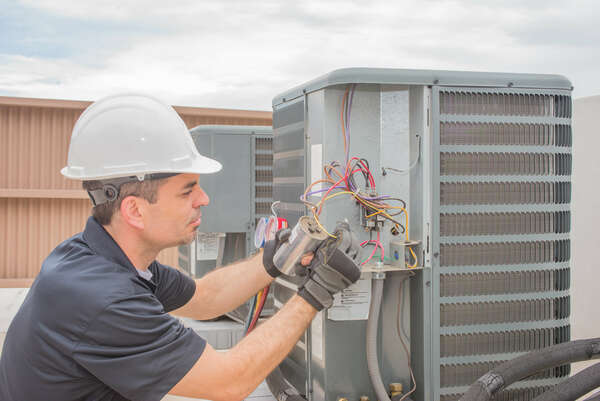Notifications
ALL BUSINESS
COMIDA
DIRECTORIES
ENTERTAINMENT
FINER THINGS
HEALTH
MARKETPLACE
MEMBER's ONLY
MONEY MATTER$
MOTIVATIONAL
NEWS & WEATHER
TECHNOLOGIA
TV NETWORKS
VIDEOS
VOTE USA 2026/2028
INVESTOR RELATIONS
COMING 2026 / 2027
ALL BUSINESS
COMIDA
DIRECTORIES
ENTERTAINMENT
FINER THINGS
HEALTH
MARKETPLACE
MEMBER's ONLY
MONEY MATTER$
MOTIVATIONAL
NEWS & WEATHER
TECHNOLOGIA
TV NETWORKS
VIDEOS
VOTE USA 2026/2028
INVESTOR RELATIONS
COMING 2026 / 2027
 chrs LLC -
May 14 -
Business -
Hvac
HVAC Repair
-
88 views -
0 Comments -
0 Likes -
0 Reviews
chrs LLC -
May 14 -
Business -
Hvac
HVAC Repair
-
88 views -
0 Comments -
0 Likes -
0 Reviews

Commercial HVAC systems are vital for maintaining comfort, safety, and operational efficiency in commercial buildings. Whether it’s an office complex, retail store, or warehouse, consistent climate control is a key factor in productivity and customer satisfaction. However, the complexity and intensity of usage for these systems mean they require diligent maintenance. Businesses seeking commercial HVAC service in Howell, MI should consider a long-term strategy focused on preventive maintenance to protect their investment and avoid costly breakdowns.
In this article, we’ll explore how preventive maintenance can significantly enhance the performance and longevity of commercial HVAC systems, reduce energy costs, and support a healthy indoor environment.
Preventive maintenance involves scheduled inspections, tune-ups, and servicing to ensure HVAC components operate efficiently. Unlike reactive maintenance—which deals with systems only after a failure occurs—preventive strategies aim to identify potential issues early, often reducing the likelihood of equipment failure and emergency repairs.
Key benefits include:
Extended equipment lifespan
Improved energy efficiency
Reduced downtime
Enhanced indoor air quality
Fewer emergency repair costs
For commercial properties, where HVAC usage is often intensive and nonstop, these benefits directly impact operational costs and tenant satisfaction.
Implementing a successful preventive maintenance program requires consistency, skilled professionals, and a tailored strategy based on the building’s unique needs.
Routine inspections should be conducted quarterly, or at least biannually. During these visits, technicians check for:
Refrigerant leaks
Dirty filters
Electrical component integrity
Belt conditions
Condensate drain blockages
Duct leakage or obstruction
These inspections provide a snapshot of your system’s current condition and highlight emerging problems.
Air filters trap dust, allergens, and other particulates, improving air quality and preventing system strain. For commercial systems, filters may need replacement every 1–3 months, depending on usage and environmental factors.
Neglecting this task can cause airflow issues, reduce efficiency, and stress components like blowers and compressors.
Dirty condenser and evaporator coils restrict heat transfer, forcing the system to work harder and use more energy. Coil cleaning should be part of regular maintenance to keep systems operating efficiently.
Thermostats control temperature regulation across the building. Miscalibrated thermostats can result in energy waste and occupant discomfort. Regularly testing and recalibrating these units helps maintain optimal temperature control.
Friction causes wear and tear on motors and fans. Lubricating moving parts reduces resistance, prevents overheating, and extends component life.
Technological advancements have transformed how commercial HVAC systems are maintained. Smart sensors and building management systems (BMS) now monitor performance metrics in real time, alerting maintenance teams to issues before they escalate.
Predictive analytics, powered by AI, can also anticipate failures based on usage trends and component health, enabling even more proactive service schedules.
Commercial buildings often use different types of HVAC systems, and each has its own maintenance requirements:
Packaged Units: Common in retail or rooftop installations, these systems need frequent outdoor unit inspections.
Split Systems: Require regular maintenance on both indoor and outdoor components.
Chillers: Used in larger facilities and require specialized servicing, especially regarding refrigerant levels and water treatment.
VRF Systems: Offer zone-based control and need detailed diagnostics and sensor calibration.
Understanding system type and usage patterns helps in designing a maintenance strategy that delivers maximum value.
Preventive maintenance should be viewed as an investment, not a cost. Consider these ROI-boosting factors:
Lower Energy Bills: A well-maintained system consumes less energy.
Reduced Repair Frequency: Fewer emergency repairs lower long-term service expenses.
Asset Preservation: HVAC systems can last 15–25 years with regular care—doubling or tripling the ROI of initial installation.
Improved Tenant Satisfaction: Comfortable, climate-controlled spaces attract and retain occupants.
Many local codes and health guidelines now mandate indoor air quality (IAQ) standards, especially in the wake of recent global health concerns. Proper HVAC maintenance is integral to IAQ compliance. This includes:
Ventilation rate checks
Carbon dioxide and humidity control
Filter efficiency monitoring
Mold and microbial growth prevention
Preventive care keeps your system aligned with compliance standards and contributes to occupant health and safety.
Not all maintenance providers offer the same level of service. Look for companies with a proven track record in commercial HVAC, experienced technicians, and transparent maintenance plans. One reputable provider in the region is Grove Heating and Cooling, known for its responsive service and detailed system diagnostics.
A trusted partner can also help you design a custom maintenance schedule based on usage, system type, and budget.
Delaying maintenance to save money often leads to larger expenses down the line—from higher utility bills to unexpected breakdowns in peak seasons. A proactive, preventive approach ensures that your commercial HVAC system continues to perform efficiently, safely, and reliably.
Whether you're managing a small retail shop or a large industrial facility, adopting a consistent HVAC maintenance strategy is key to protecting both your equipment and your bottom line. For comprehensive HVAC support in Michigan, including system upgrades, inspections, and seasonal tune-ups, consider visiting Grove Heating and Cooling to explore your options.
